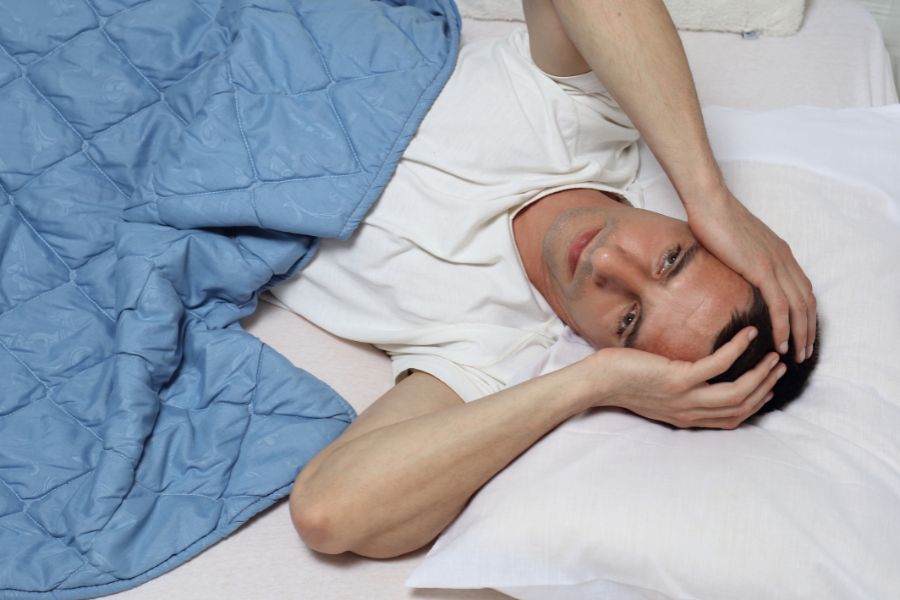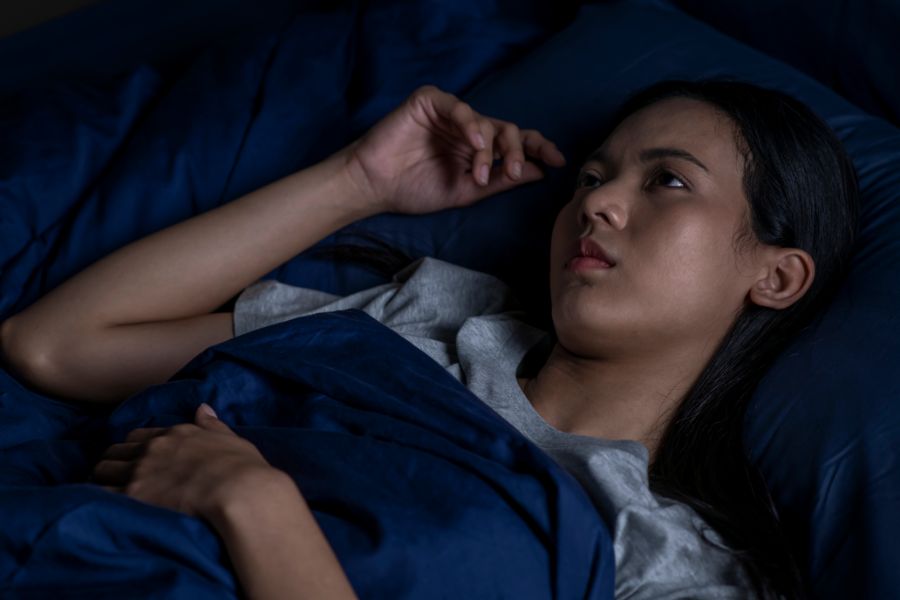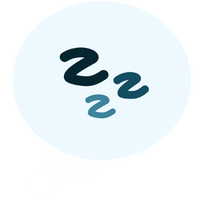Most people suffer from a bad night’s sleep from time to time, but when it becomes a regular occurrence, it can become detrimental to your overall quality of life.
Sometimes, even when you’re exhausted at night, it can be impossible to drop off – and to examine some of the most common causes.

In this post, we look at the question, why can’t I sleep at night even when I’m tired?
How Do We Sleep?
Before we talk about why you might not be able to get to sleep at night even if you’re tired, first, we need to think about how we sleep and what controls it.
One of the most important factors that control our sleep patterns is what’s known as the circadian rhythm.
In essence, the circadian rhythm is like our natural internal body clock that tells us when to sleep and when to wake up, and it’s triggered by certain external cues, of which the most important is light.
In the evening when there’s less light, the body begins producing melatonin, a hormone that makes us feel sleepy. Then when the sun comes up in the morning, it tells us that it’s time to wake up and be active again.
Melatonin levels usually peak between 2am and 4am, and they are at their lowest during the day.
Coupled with this is the concept of “sleep debt”, the amount of sleep a person has had compared to how much they need (which varies from individual to individual).
As sleep debt increases, a build-up of a chemical called adenosine in the forebrain occurs.
Adenosine is a neurotransmitter that effectively makes us feel tired, and our sleeping and waking cycles are governed by an interplay between our circadian rhythm and the amount of sleep debt we have accrued.
However, sometimes the balance can be thrown off, which leads to insomnia, or the inability to sleep.
Insomnia – a Symptom and A Condition
Most people will have heard of insomnia, but perhaps fewer people are aware of the fact that insomnia is both a condition and a symptom.
In other words, insomnia may be the result of a range of other factors – or it can have no cause, in which case, insomnia itself is the primary issue.
Furthermore, there are different types of insomnia, including the inability to fall asleep and the tendency to spontaneously wake up before you’ve had enough sleep, typically considered to be before you’ve been asleep for 6.5 hours.
The inability to fall asleep, even when tired, is known medically as “sleep onset insomnia”.
Most people experience this occasionally or for short periods during their lives, but it usually doesn’t last.
However, when the condition persists for more than even just a few nights, it can impact a person’s quality of life or their ability to function at work, and when the condition becomes chronic, it can be debilitating, leaving a person constantly exhausted but yet unable to sleep.
There are many causes of sleep onset insomnia, and it can often be possible to identify the cause and make changes to resolve the issue.
However, sometimes, the cause is not clear – and sometimes insomnia itself can be the cause of insomnia, even after the original cause has been resolved, because the sufferer feels anxiety about not being able to sleep, which then prevents them from sleeping.
If you suffer from sleep onset insomnia, the first step is to try to identify any possible causes, so let’s have a look at some of the most common now.
Causes of Tired but Can’t Sleep

Anxiety
One of the most common causes of insomnia is anxiety. If people go to bed with issues that they haven’t dealt with, they often lie awake turning them over in their minds, and this can make it impossible to sleep.
This can easily give us the odd sleepless night, but if you are the kind of person who overthinks things all the time, it can lead to more prolonged or even chronic insomnia.
Stress
Stress is another factor that can make it difficult to sleep. If you have too much pressure at work or you are under significant stress in any other area of your life and are unable to deal with it properly, it can be a major factor in preventing you from sleeping.
Depression
Depression is known to be related to insomnia, but the relationship between insomnia and depression can be complex.
When a person is depressed, the body releases higher levels of cortisol, a hormone that is usually released during the day when we are awake and that has the opposite effect of melatonin, which makes us feel sleepy.
As a result, the increased amounts of this hormone can make it more difficult to sleep at night.
However, if the insomnia is caused by something else, the poor quality of sleep the sufferer experiences can also lead to depression. This can then create a vicious cycle where it becomes increasingly difficult to sleep, thus deepening the depression.
So in other words, insomnia can be a cause as well as a result of depression.
Screen Time and Blue Light
Our circadian rhythm is triggered by cues from light, and we have evolved to take these cues from the sun.
However, nowadays, we are surrounded by artificial light, and in recent years with the advent of smartphones, we spend increasing amounts of time in front of screens.
It is thought that the blue light emitted by smartphones, tablets and laptops in particular can interfere with our circadian rhythm, confusing our internal clocks and tricking our bodies into believing it’s time to be awake when it’s really time to sleep.
It is thought that this is an increasingly prevalent cause of insomnia and poor-quality sleep in the modern world.
Alcohol
While some people may attempt to self-medicate insomnia with alcohol, this is actually counterproductive, both in the short term and in the long term.
In large doses, alcohol makes you feel drowsy, and if you continue to drink, you will eventually fall asleep or pass out.
However, in smaller doses, alcohol acts as a stimulant, so if you try to make yourself sleep by consuming a few glasses of alcohol before bed, it will have the opposite effect, making it harder to drop off rather than easier.
Furthermore, even if you fall asleep, your sleep quality will be poorer and you will spend less time in REM sleep – and when the sedative effects wear off, you may wake up and find it hard to fall asleep again.
The reason for this is alcohol’s effect on what’s known as GABA-A receptors in your brain.
These are receptors that bind with gamma-aminobutyric acid (GABA), a kind of neurotransmitter. When this happens, chloride ions enter the neuron, causing it to fire more slowly, a signal that makes you feel sleepy.
When alcohol is present, the effect is at first enhanced, which is why we fall asleep after drinking, but when it wears off, the effect is reversed.
The neurons become immune to the effect of the GABA and alcohol, so the chloride ions can no longer enter the neurons, causing us to awaken with a “wired” feeling and leaving us unable to get back to sleep.
Moreover, if you drink often, the immunity of the neurons to the effects of GABA becomes more lasting, so even when you aren’t drinking, the chloride ions still can’t enter.
As a result, you may end up with chronic insomnia that leaves you feeling exhausted at night but still unable to sleep.
Nicotine
Like alcohol, nicotine is a stimulant, but many people mistakenly believe that smoking makes you more relaxed and can possibly help you sleep.
The reason that smoking a cigarette makes smokers feel relaxed is because the nicotine hit relieves the anxiety caused by nicotine withdrawal – but this anxiety wouldn’t have been there in the first place if the smoker wasn’t addicted to cigarettes.
However, nicotine doesn’t make you drowsy or sleepy and instead will make it harder to get to sleep if you smoke before going to bed.
In addition, nicotine withdrawal can also cause insomnia, so if you’re a smoker, your habit can interfere with your sleeping patterns whether you smoke before bed or not.
Caffeine
Drinking coffee or otherwise ingesting caffeine is among the most common causes of insomnia.
The effects of caffeine kick in only about ten minutes after drinking a coffee, but it may take over ten hours for it to completely leave the system.
This means drinking coffee in the evening – or even in the late afternoon – may make it difficult for you to sleep.
Related: Why Doesn’t Coffee Wake Me Up?
Shift Work
People whose jobs involve shift work are at much higher risk of insomnia than others because the nature of their work and their unnatural shift patterns mean it can be impossible to get into the kind of routine that’s conducive to good sleep.
In effect, working shifts at different times of the day forces you to stay awake when your circadian clock is telling you to sleep but then dictates that you have to sleep when your body thinks it should be awake.
This condition is known as shift work disorder and is understandably common among those who work such schedules, so if you are a shift worker, this is a likely cause of your insomnia.
Daytime Napping
Daytime napping can disrupt your sleeping patterns because if you sleep too much during the day, the chemical messengers such as adenosine in your body that tell your body to go to sleep might be put out of sync.
There are many benefits to napping, but it’s all about finding the right strategy. If you nap too late in the day or nap for longer than about half an hour, it can make it much harder to get to sleep at night.
Long Covid
Although the covid pandemic is still fresh in the memory and isn’t yet completely over, there is already some evidence that long covid can cause insomnia in some people who were particularly badly affected after contracting the illness.
Jet Lag
Jet lag is a well-known cause of short-term insomnia because it confuses your body and can throw out your natural circadian rhythm for several days.
It’s possible to suffer from jet lag, even if you only cross a single time zone, and as a guideline, you can expect the effects to last as many days as the number of time zones you traveled across. This means if you travel across five time zones, your jet lag will last around five days.
Jet lag is also known to be more pronounced when travelling east than when traveling west.
Physical Exercise
Many athletes report trouble sleeping at night after exercise, and going for long runs or doing particularly strenuous gym sessions, even earlier in the day, can also make it more difficult to sleep.
Other Sleeping Disorders that Can Cause You to Be Tired
As well as these external causes of insomnia, several other conditions may be misdiagnosed as insomnia. Here are some of the most common.
Delayed Sleep Phase Disorder
Delayed sleep phase disorder (DSPD) is one of the most common conditions to be misdiagnosed as insomnia.
In people with this condition, the onset of sleep is delayed, so they become sleepy much later than “normal” people. However, once sleepiness arrives and they fall asleep, unless they are woken up by something, they will continue to sleep into the day until they have slept enough.
However, since people might not realize they have DSPD, and since working commitments might not allow them to continue to sleep into the late morning, they may assume they have – or be diagnosed as having – some form of insomnia.
The best way to deal with this condition is to find a rhythm that accommodates your preferred sleep patterns – although this is not always practical for everyone.
Restless Leg Syndrome
Restless leg syndrome is the uncontrollable urge to move one’s legs – or arms – while you sleep.
This condition may leave sufferers waking up feeling groggy due to a reduced quality of sleep –but it is not likely to cause sleep onset insomnia.
Sleep Apnea
Sleep apnea is a condition that causes the sufferer to stop breathing during sleep. It causes sufferers to awaken frequently through the night, although they will usually drop back off again straight away and won’t remember it.
It can leave you feeling groggy and tired in the morning, but it won’t cause sleep onset insomnia.
However, it’s a serious condition that needs to be identified and treated as quickly as possible.
Things to Help Improve Your Sleep
If you suffer from insomnia caused by any of the reasons above, the first steps toward resolving the issue usually involve improving what’s known as your sleep hygiene – which is another way of saying doing everything you can to make it easier for you to sleep.
Here are some of the things you can try.
Stick to A Regular Sleep Routine
Sticking to a regular routine can help you sleep better because it trains and conditions your body to keep to a certain rhythm.
This will involve winding down and going to bed at the same time each night and also waking up at the same time in the morning.
If you work shifts, request shifts to become progressively later if possible rather than earlier since it’s easier to adapt in this direction.
Prepare Your Bedroom Properly
Prepare your bedroom properly by shutting out all light, perhaps through the use of blackout curtains. Adjust the temperature to one comfortable for sleeping and consider using a white noise machine. Also, earplugs and an eye mask can help with excess light and noise.
Do Unstimulating, Relaxing Activities Before Bedtime
Before bed, do something unstimulating like reading a book, taking a warm bath or listening to relaxing music to help put you in the right frame of mind for sleep.
Shift Bedtime
If you find you can’t sleep at a particular set time, consider going to bed slightly later. For many of us, we can’t force our minds and our bodies to sleep before they’re ready, so follow your body’s cue and go to bed a little later.
Deal with Anxiety at A Set Time
If you are troubled by anxiety or stress, set aside a specific time to deal with them at least two hours before bedtime.
It might help to write the issues down, and you can work out actions to take in the future – but once your “worry time” is over, you need to resolve not to think about them until the following day since overanalyzing them as you lie awake in bed won’t help.
Keep a Sleep Diary
Keep a sleep diary and write down things like the time you went to bed, the time you think you went to sleep and the time you woke up the following morning – as well as how well you think you slept.
You should also note other details such as the amount of coffee you drank, whether you had any alcohol, what you did before you went to bed and what was on your mind.
Keeping a sleep diary in this way may reveal certain behaviors to you that you were unaware of that are affecting your ability to get to sleep at night.
Avoid Using Screens Two Hours Before Bedtime
Blue light from electronic devices can trick your body into thinking it should be awake, so stop looking at screens at least two hours before bedtime.
Avoid Drinking Caffeine or Alcohol Late in The Day
Avoid coffee in the afternoon and evening and stop drinking alcohol at least two hours before you go to bed. Keeping a sleep diary may well help you realize that drinking coffee or alcohol is a big part of the problem, even if it isn’t the only cause of your insomnia.
Read More: Keep Waking Up At 3am?
If Nothing Works, See a Doctor
There are many causes of symptomatic sleep onset insomnia, and the first step is to evaluate your sleep hygiene and try to make whatever improvements you can.
However, sometimes it can be hard to understand what’s causing your insomnia – and you may simply be suffering from insomnia as a condition rather than as a symptom – in which case, the best option is to seek medical advice from a sleep specialist.
